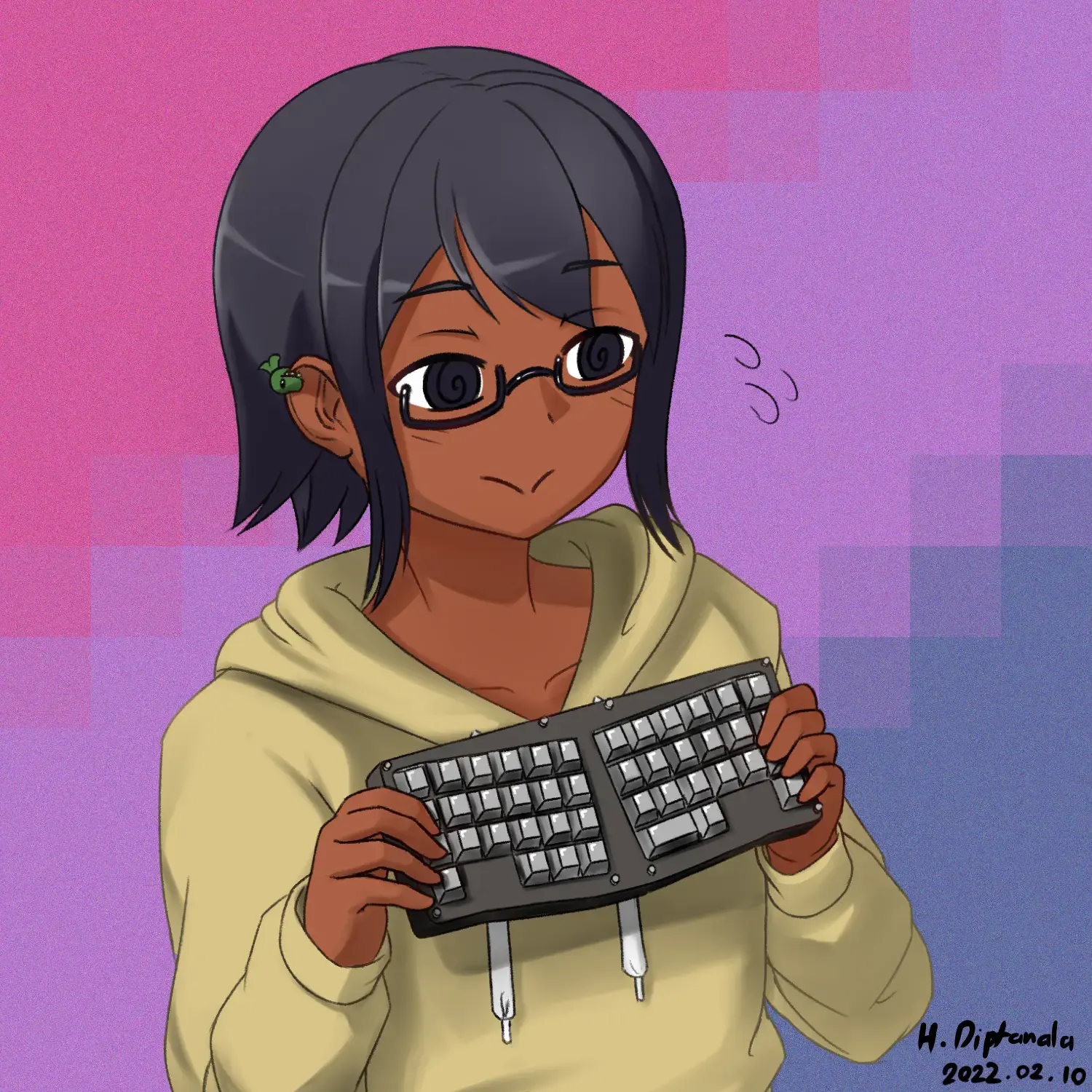I’m not a true mechanical keyboard enthusiast. I mean I like a good keyboard for typing code, so I rolled with model-Ms in the 80s and 90s, then some expensive Cherry keyboard I only recently retired because it was utterly spent (and it was PS/2), and now I happily use a Wooting Two HE.
I’m so glad the mechanical gaming keyboard scene has developed so much: it means there’s a plethora of really excellent keyboards for the rest of us who don’t play games.
But something utterly baffles me: why are high-quality keyboards getting smaller?
There’s a lot more keyboards without the numpad and the block of middle keys - whatever they’re called - or with the middle keys reduced or squashed up awkwardly on the side, than full-size plain old 102- or 104-key layout keyboards. What’s wrong with the numpad? Isn’t more keys generally better?
Back in the days, I bought the original Happy Hacking keyboard because it kind of made sense to maneuver around in our server room with a small keyboard that took up less space. Typing on it drove me up the wall but it was convenient to carry. And I guess it was also good option for going to LAN parties with a smaller backpack. But other than that, for a keyboard that never leaves your desk, I don’t get it.
Are there other advantages to smaller keyboards? Genuine question! I’m not dumping on smaller keyboards: to each his own and if you’re happy with yours, more power to you. I’d just like to know why you prefer smaller.
Smaller keyboards:
- Encourage you to move your hands less. Part of this is allowing your mouse to be closer, especially if you’re right handed.
- Aesthetically look cleaner and less cluttered
This is it for me, I basically don’t use those keys daily and can access them via a function key when I rarely need them, so I’m gonna prioritise the aesthetics and compactness.
For me, having the symbols I use in a function layer is better than having them spread around, because I don’t have to move my hands as much.
Point 2 is absolutely subjective, though. Personally, I think a full size or TKL look a lot better than a compact. It’s too distracting seeing something “missing” from a traditional setup. Though, I also like to have my keyboard and mouse a good distance from each other and spread out, rather than close and centered in front of me.
I’m one of those weirdos who actually really likes using a smaller keyboard so I’ll give you a few reasons I like smaller keyboard and a few why I don’t like larger ones.
First of all, desk space. I have a very small desk so not having the numpad makes for a lot more space for my mouse.
I also find when gaming that my arms fall at a weird and uncomfortable angle when I have the keyboard and mouse at a comfortable distance apart.
I don’t tend to use the numpad, or 9 key cluster above the arrow keys very often so the ones I do use (delete, Pg up and Pg down) are just mapped to a new layer. My board is ortholinear so I’ve also got the numpad mapped to a layer if I ever want to use it.
The function row is also re-mapped over the number row with the - and + acting as 11 and 12 because I very rarely need to use a function key and a number key at the same time or in quick succession so theres no need for the seperate keys.
I don’t program much but when I do, I’ve got all the relevant symbols labelled with their layers on the front of the cap so they’re not hard to find when I need them.
I’m also very much not a tidy desk person and I do a lot of my hobby work at my desk so having a nice small keyboard I can cram wherever I can when I need it and just move out of the way when I don’t means I’m not always shuffling stuff around my desk to make space for this huge keyboard.
Overall however, I just really like the look of a nice, small, compact keyboard with everything I need just there. It’s visually nice to have a uniform block of keys with no gaps, no larger or differently shaped keys, and that’s just not something a larger keyboard offers me.
I can absolutely see how this sort of thing doesn’t work for most people because there is an element of having to re-learn muscle memory and such, but for most people that have tried it, they seem to find that when it works, it works very well!
I’m terribly disappointed there isn’t a picture of your keyboard to visualize what you’re saying.
I second this sentiment
Hoo boy. This is an issue close to my heart about which I could talk for an unreasonable length of time.
I’m an accountant. Yes, spreadsheets. I always thought I you’d have to pry my numpad from my cold dead hands.
About 6 months ago I bought one of the saucy little mech boards of which you speak. A keychron k6. It was a whimsical purchase. It would make my thinkpad set up look better when I posted pictures to /r/thinkpad.
Turns out, I love using it so much that I can do without a numpad.
The core element to answer your “why not full size” question is simply that this little harlot fits in my backpack, where a 100% board would not.
Anyhow, I have a d-pad, and 2x function keys that can modify any key to whatever you want. So I don’t miss having any of the extra special keys. It took surprisingly little time to get used to.
On occasion, I do have to grind through entering a list of numbers, but it’s really not that often and doesn’t take that much extra time.
I do have to grind through entering a list of numbers
Have you considered a numpad layer? They’re great. All of the speed and convenience with none of the wasted space or extra arm movements.
I have a numpad for both hands on my Redox :-)

Woah that’s cool. Gonna check that out.
The K6 is not programmable out-of-the-box, but it seems some people have successfully installed QMK firmware on it (with caveats); https://github.com/CanUnesi/QMK-on-K6/
If you just want to try the numpad thing out, it might be easier to use something like AutoHotKey. Here’s an example of a script that uses CapsLock to toggle the numpad layer.
Of course, AHK scripts only work with the computer you’ve installed them to, whereas using programmable firmware will work regardless of which device you connect your keyboard to.
By the way, there is a !thinkpad@lemmy.ml community. Feel free to post there, we need content here on Lemmy. ;)
accountant no 10-key happy
Why must you fill my thread with lies?
(LOL, your post is truly unexpected.)
Accountant here too (well assistant tax adviser doing mainly accounting) and I have the numpad on a layer on the right hand and often used shortcuts on the left hand. It is really nice and only took me like a week to get comfy with.
The extra shortcuts also help a lot, because they are hardcoded into the software and some of them are pretty dumb (shift+F8 and ctrl+numpad / f.e.).
One thing I haven’t seen in this thread yet is how lower number keys allow for an even split and this ergo boards that allow for better posture, especially for the shoulders.
A mystery for me, the numpad is essential and at least 60 percent of the nav cluster is in constant use. And I prefer the full keyboard look
The numpad Is essential or completely useless based on the PC usecase
PC players never use a spreadsheet or the calculator…?
Well of course no! Why should they, honestly! Do you really think a spreadsheet is a daily tool for the average person?
I didn’t say “daily” . If the number pad is there, you can always just… not use it. The opposite doesn’t exactly work.
Imagine you had to swim thru your bathtub to use the toilet every night. Sure it’s nice when you need to bathe, but more often you’re just going to want to skip over it to the thing you do more often—taking a leak. Rather than design your bathroom unergonomically, inconveniently, rearrange it to make more sense. You can buy separate numpads & place it somewhere else on your desk for when you need it, but keep the mouse closer to your keyboard.
Perfect answer
I literally don’t understand why you’re so passionately against something some people may want to use. If you don’t use it, fine, it literally takes up about 3 horizontal inches of desk space. And no, it’s not “a bathroom of water you have to swim through multiple times a day”. Also, I’m not about to buy a separate numpad to “keep the mouse close to my keyboard”. That’s absurd, what real-work benefits does that actually provide? You do understand some people do use it, yes?
Being “passionately against something” is my whole modus operandi.
If you use your mouse more than your numpad, you are doing your joints a disservice by not optimizing the ergonomics of your desk setup. I’m really glad we have a lot of options now to get anyone their custom setup unlike the ’90s & earlier. Recent years, separate numpads with good switches are easy to come by as well—heck, if you like mechanical switch over the alternatives, maybe you just want light linear switches for your numbers for your numpad so you can punch those numbers faster & without restraint while having a different switch an your main board.
Yeah, that seems to be the case
Chances are: they are there on smaller keyboards too. It might not be in the usual spot while also hidden behind a layer but its there.
This used to be a showstopper back when most of the available keyboards are not fully customizable firmware-wise. With the advent of QMK and VIA(L) on a lot of readily available keyboards, however, you can pretty much put any functionalities anywhere on any layer(s) you see fit.
The layer thing is really impressive, I’d actually love to have it on my normal huge keyboard. But I need the numpad available on the first layer, using a mouse is a must in my work
I ditched my numpad when I set up a layer that puts 456 right under jkl. My left hand hits the layer key (how much do you use both your left and right hands while using a numpad) so it’s right there and I don’t even have to move my hand. Doing so let’s me have the essential mouse closer to the boards.
It’s a full numpad, I’ve got the keys setup around it to put + - enter, etc there.
I’ll also add though, it’s an ortholinear so it’s also the same grid layout and a normal numpad.
Well damn that actually sounds good. How much time did it take you to get used to it?
The numpad usage was super quick, but my first (I’ve got a few and all follow that pattern) was a tented, split, ortho keyboard, the Iris. The ortho part for normal typing took me about two weeks or so to get up to normal speed. The split part has definitely helped my RSI though.
I definitely have tweaked my keymap for other special keys and media usage and such along the way. I’ve got the movement arrow keys under my sdf keys (for left, down, right, up on e) as well as of up and down on w&r so that hand doesn’t have to move either. Been living the ortho split life for 6 years now and I can easily type all day at work without any issues. (I’m a DevOps engineer so I do lots of typing, coding, console work all day long)
For a while at work I had a numpadless keyboard and a dedicated numpad placed right of my mouse (I’m right handed), I liked it a lot.
I wanted to try this but all keyboards I use have a numpad. The only thing that worried me was getting used to something you can’t have on every pc
Ironically I set it up so after getting used to notebook’s keyboards that were more centered relative to the screen
The avarage user doesn’t need all the buttons accessible at every moment as such are willing to trade convenience for space saving and cost reduction. Some people though mainly professionals with hyper specific niches go the opposite direction and trade space and cost for oversized keyboards in the name of efficiency.
Trading terminal keyboards are the easiest keyboards to point to utilizing their additional keys for more streamline trading in an era before algorithmic trading

Belive it or not just like click switches, large keyboards still popup within the mech keyboard community. Hyper 7 being the most well known (and has a group buy currently going) but there’s also the wombat 200% which features twenty rotary encoders. Some people have been getting the best of both worlds by utilizing a modular mindset. A 75% keyboard with an external numpad and macro pad has the same functionality as a battleship.
Ok the Hyper 7 totally blew me away. Absolute overkill hit damn I wish I had money to burn on that right now.
I’m the type that has to have the number pad, I play a lot of older games that tend to be much easier to play with it for keyboard shortcuts, and I’m just way better at typing numbers invites the top row.
I don’t know but I feel the same. My main gripe is with media keys, because I don’t want Fn key combinations, but dedicated media buttons, which is increasingly rare. The most appealing keyboard I have laid eyes on recently is Das Keyboard which has a volume wheel, media keys and is full size, but it’s very pricey and not perfect still.
I have a 40% ortholinear kb because it’s more ergonomic. My fingers are never have to travel more than 2 keys away from home row. There are enough built in layers that I never feel like I’m missing a key. All keys are remappable. Beyond that I think it looks neat - folks always ask about it when they see it. When using a mouse and keyboard, my arms are kept at a reasonable distance apart (overall hands are closer together), so I can work or game longer without feeling like my shoulders or back are strained.
I use keyboards in the 40%-65% range. For me it is about reduced travel. Almost no travel for typing any key and minimal travel for the mouse.
I wouldn’t use a keyboard that small if it wasn’t for QMK, the open source keyboard firmware. We essentially have dedicated layer keys. A key when tapped or held remaps the keyboard. For myself that is usually caps lock and a couple keys on the bottom row. I select keyboards that have the space bar split into 3-4 keys for this to work. 4 is preferred to put backspace next to space.
With 40 keys and 3 layers that’s (40 keys - 3 layer keys) * (1 base layer + 3 activated layers) = 148 keys within reach of home row. A full size is around 120 keys.
I’m used to software using “leader” keys like vim and tmux, so it never really bothered me to use layers. I don’t get why anyone would want their hands always moving to reach keys since I started using layers.
I’m a heavy VI user, but the one thing I can’t stand is HJKL navigation. Damn that to hell and back: I’d much rather stay in edit mode and move around with the arrow keys. HJKL can burn in hell. As for the numpad, I don’t use it too often, but when I have to type rows and rows of numbers in my code for some reason, I really miss it. And that curiously happens often enough that I prefer the numpad to remain firmly attached to the rest of the keyboard.
The mouse being closer isn’t an issue for me because, as I mentioned elsewhere in the thread, I use a trackball.
I have a separate “macro pad”, essentially a numpad layout, also mechanical running QMK. I keep it to the right of the mouse. I don’t use it much anymore, but I do have the option.
I also have an MMO mouse for gaming. WoW, EvE, and FFXIV were too difficult with layers.
I don’t mind HJKL once I got used to it. My arrow keys are bound to caps lock + HJKL, lol.
Weird tangential question: what is the cutoff point for FFXIV for you and why?
I recently swapped to a moonlander and I feel okay with a gaming layer, but I also do not do savage raids or above.
I use a 45% with no dedicated number row. Been a couple years but I mained a Reaper. 12 buttons for my AoE rotation (plus a few utility) and another full 12 for single target. In early WoW days I got away with main abilities on 1-6, Q, E, F, G, R, X, Z and their modded versions (shift, ctrl). Without a number row, I just didn’t have enough keys. I probably could have come up with additional mod keys via layers to make it work, but the MMO mouse just made it easy to have a numpad at my thumb.
Macros like WoW would have helped also. The rotation was pretty predictable from what I remember unlike my Frost DK in WoW which was more proc based and like playing DDR on my keybinds.
Thanks! Due to how queueing abilities work in FFXIV, rotation macros ain’t a thing even on predictable classes.
I see what you mean with the number row. I also like to have F1-F4 accessible plus tab.
Good thing the moonlander is on the big side there.
I don’t get it either, but I also with with AS400s daily and therefore need f1-24 and I’m not going to deal with all the layering setup needed for that when I can get a normal keyboard and hit shift+F4 for F16 instead of shift+left ctrl+F4. It doesn’t seem like much but when you’re using F13-24 a lot then it gets annoying.
I also want numpad, I don’t want to type IP schemes on the number row
AS400s daily
Just changed teams and AS400s will be in my wheelhouse soon. Would an extended function layout be nice?
I don’t think so, you get pretty used to the shift+f# pretty quick. In my experience most of the common option like prompt, exit, expand options, and cancel are on the normal row like F4, F3, F10, and F12.
Get used to the command line and learn to think of words without vowels lol you’re going to be writing work and display as wrk and dsp from now on.
Do yourself a favor and do a wrksbs when you get access and learning what subsystems are part of your org’s operation and what they are individually responsible for. Remember look don’t touch for a while like all new systems. Good luck and enjoy the green screen life!
I switched to a TKL (tenkeyless) to reduce the distance between my hands when my right hand is on the mouse, and it feels so much better.
I got a programmable keyboard, so I remapped the keys around where my right hand rests to be the numpad keys when I hold the capslock key. That way I can still have the convenience of the numpad without having an actual dedicated numpad, although I’m still getting used to using it this way.
- QMK (rather, “easily” accessible keyboard firmware creator) makes keyboard less and less reliant on having a dedicated button for all of the functionalities provided by full size.
- No need to move out of homerow is super nice, especially if you dont need to use your mouse frequetly.
- its nice
For most users/use cases, there isn’t a need for for so many dedicated keys - if they are prepared to learn layouts with multiple layers. There are several notable advantages: cost, portability, reduced footprint (keeping hands closer together when using mouse and keyboard), and reduced finger travel/stretch. These last two are good preventative measures for carpal tunnel.
I chose a 40% ortholinear keyboard specifically because I make heavy use of the numpad in my work. I keep the numpad on one of four layers and I find using it to be quicker and more seamless to transition to than when using a full sized keyboard. I only wish that more manufacturers made ortholinear layouts…
Gamers generally want more room on the desk so their mice can travel further without needing to be repositioned.
I love having a numpad for extra keybinds in MMOs and for number inputs for work, but I’ve since switched to a TKL and never looked back.
I still miss the numpad but that thing can be bought separately, and not smashing my mouse into my keyboard is a big plus.
Looking into upgrading to a Wooting 80HE once that launches; it’s like a TKL that wants to be questionably special, but given Wooting’s reputation I’d wager it’d still be better than anything else on the market.
I use a 64 key keyboard. Barely have to move any of my fingers which is great for reducing my RSI. I hate how standard keyboards just have this one giant key for your thumb. Your thumb is your strongest digit and it’s just used to slap this slab. On the ortho keyboards I’ve become more used to recently often have a thumb cluster so you can have all of your modifiers and whatnot there. Less stretching with your pinky for ctrl, fn whatever (which is how I got my RSI). Having enter, shift, backspace and delete at my … Thumbtips … Is a game changer.
I liked having less space between my hands (left hand on the keyboard, right hand on the mouse). I also rarely use the numpad and other keys, so the negligible sacrifice was worth it for better ergonomics.













